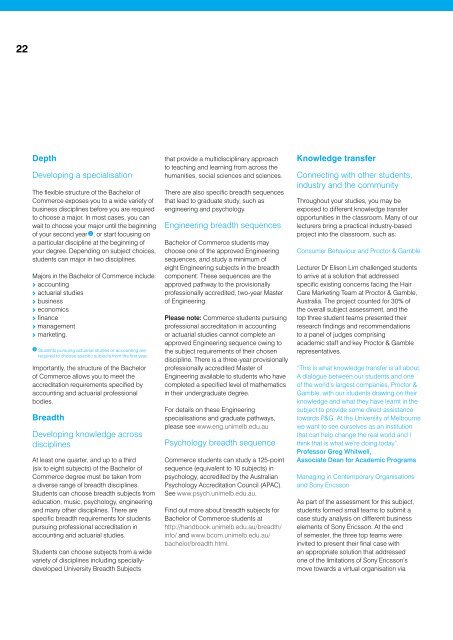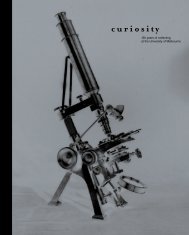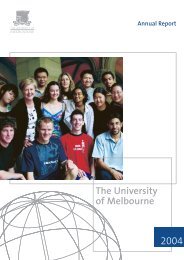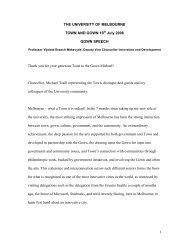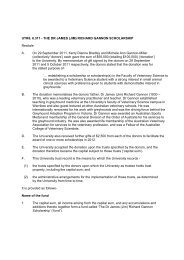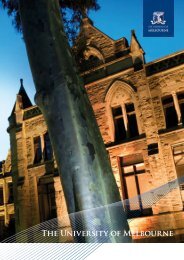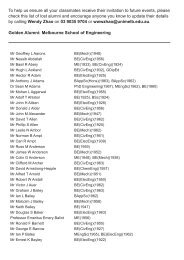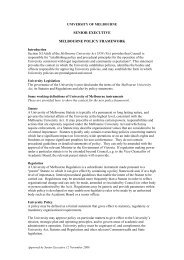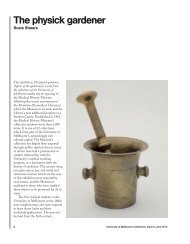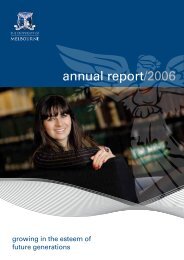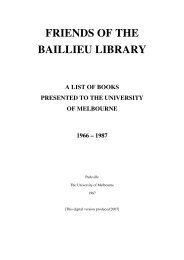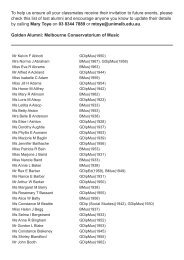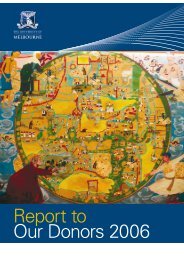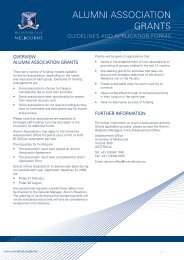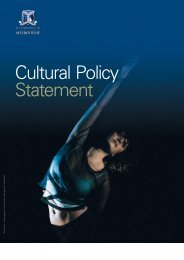2010 International Undergraduate Prospectus nts. u.au
2010 International Undergraduate Prospectus nts. u.au
2010 International Undergraduate Prospectus nts. u.au
You also want an ePaper? Increase the reach of your titles
YUMPU automatically turns print PDFs into web optimized ePapers that Google loves.
22<br />
Depth<br />
Developing a specialisation<br />
The flexible structure of the Bachelor of<br />
Commerce exposes you to a wide variety of<br />
business disciplines before you are required<br />
to choose a major. In most cases, you can<br />
wait to choose your major until the beginning<br />
of your second year W, or start focusing on<br />
a particular discipline at the beginning of<br />
your degree. Depending on subject choices,<br />
stude<strong>nts</strong> can major in two disciplines.<br />
Majors in the Bachelor of Commerce include:<br />
>>accounting<br />
>>actuarial studies<br />
>>business<br />
>>economics<br />
>>finance<br />
>>management<br />
>>marketing.<br />
W Stude<strong>nts</strong> pursuing actuarial studies or accounting are<br />
required to choose specific subjects from the first year.<br />
Importantly, the structure of the Bachelor<br />
of Commerce allows you to meet the<br />
accreditation requireme<strong>nts</strong> specified by<br />
accounting and actuarial professional<br />
bodies.<br />
Breadth<br />
Developing knowledge across<br />
disciplines<br />
At least one quarter, and up to a third<br />
(six to eight subjects) of the Bachelor of<br />
Commerce degree must be taken from<br />
a diverse range of breadth disciplines.<br />
Stude<strong>nts</strong> can choose breadth subjects from<br />
education, music, psychology, engineering<br />
and many other disciplines. There are<br />
specific breadth requireme<strong>nts</strong> for stude<strong>nts</strong><br />
pursuing professional accreditation in<br />
accounting and actuarial studies.<br />
Stude<strong>nts</strong> can choose subjects from a wide<br />
variety of disciplines including speciallydeveloped<br />
University Breadth Subjects<br />
that provide a multidisciplinary approach<br />
to teaching and learning from across the<br />
humanities, social sciences and sciences.<br />
There are also specific breadth sequences<br />
that lead to graduate study, such as<br />
engineering and psychology.<br />
Engineering breadth sequences<br />
Bachelor of Commerce stude<strong>nts</strong> may<br />
choose one of the approved Engineering<br />
sequences, and study a minimum of<br />
eight Engineering subjects in the breadth<br />
component. These sequences are the<br />
approved pathway to the provisionally<br />
professionally accredited, two-year Master<br />
of Engineering.<br />
Please note: Commerce stude<strong>nts</strong> pursuing<br />
professional accreditation in accounting<br />
or actuarial studies cannot complete an<br />
approved Engineering sequence owing to<br />
the subject requireme<strong>nts</strong> of their chosen<br />
discipline. There is a three-year provisionally<br />
professionally accredited Master of<br />
Engineering available to stude<strong>nts</strong> who have<br />
completed a specified level of mathematics<br />
in their undergraduate degree.<br />
For details on these Engineering<br />
specialisations and graduate pathways,<br />
please see www.eng.unimelb.edu.<strong>au</strong><br />
Psychology breadth sequence<br />
Commerce stude<strong>nts</strong> can study a 125-point<br />
sequence (equivalent to 10 subjects) in<br />
psychology, accredited by the Australian<br />
Psychology Accreditation Council (APAC).<br />
See www.psych.unimelb.edu.<strong>au</strong>.<br />
Find out more about breadth subjects for<br />
Bachelor of Commerce stude<strong>nts</strong> at<br />
http://handbook.unimelb.edu.<strong>au</strong>/breadth/<br />
info/ and www.bcom.unimelb.edu.<strong>au</strong>/<br />
bachelor/breadth.html.<br />
Knowledge transfer<br />
Connecting with other stude<strong>nts</strong>,<br />
industry and the community<br />
Throughout your studies, you may be<br />
exposed to different knowledge transfer<br />
opportunities in the classroom. Many of our<br />
lecturers bring a practical industry-based<br />
project into the classroom, such as:<br />
Consumer Behaviour and Proctor & Gamble<br />
Lecturer Dr Elison Lim challenged stude<strong>nts</strong><br />
to arrive at a solution that addressed<br />
specific existing concerns facing the Hair<br />
Care Marketing Team at Proctor & Gamble,<br />
Australia. The project counted for 30% of<br />
the overall subject assessment, and the<br />
top three student teams presented their<br />
research findings and recommendations<br />
to a panel of judges comprising<br />
academic staff and key Proctor & Gamble<br />
representatives.<br />
“This is what knowledge transfer is all about.<br />
A dialogue between our stude<strong>nts</strong> and one<br />
of the world’s largest companies, Proctor &<br />
Gamble, with our stude<strong>nts</strong> drawing on their<br />
knowledge and what they have learnt in the<br />
subject to provide some direct assistance<br />
towards P&G. At the University of Melbourne<br />
we want to see ourselves as an institution<br />
that can help change the real world and I<br />
think that is what we’re doing today”.<br />
Professor Greg Whitwell,<br />
Associate Dean for Academic Programs<br />
Managing in Contemporary Organisations<br />
and Sony Ericsson<br />
As part of the assessment for this subject,<br />
stude<strong>nts</strong> formed small teams to submit a<br />
case study analysis on different business<br />
eleme<strong>nts</strong> of Sony Ericsson. At the end<br />
of semester, the three top teams were<br />
invited to present their final case with<br />
an appropriate solution that addressed<br />
one of the limitations of Sony Ericsson’s<br />
move towards a virtual organisation via


